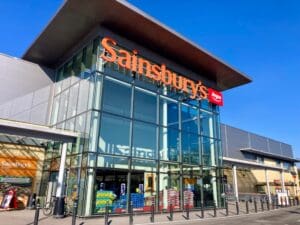
Sainsbury’s sees food sales rise, but argos drags on first-half performance
Sainsbury’s, the UK’s second-largest supermarket chain, has reported a 5% rise in food sales for the first half of the year, reflecting growing market share and increased demand for its premium range, Taste the Difference.
This growth has positioned Sainsbury’s as a top performer in the British grocery market, with a market share reaching 15.2%, just behind Tesco.
CEO Simon Roberts attributed the strong food sales to shifting consumer habits, with more customers opting to eat at home and treat themselves. “We’re making the biggest market share gains in the industry, with continued strong volume growth,” Roberts said, noting that shoppers were spending more on high-quality products as the cost of eating out rises.
The company has focused heavily on food, investing in its Aldi price-match scheme, launching 600 new products in its convenience stores, and driving loyalty through Nectar prices. Roberts estimated that 25% of Sainsbury’s weekly shoppers are new customers, indicating that these initiatives are paying off.
Despite strong performance in groceries, the group faced headwinds from its struggling Argos division. Argos sales fell by 5% in the six months to September 14, with unseasonable summer weather, consumer caution around big-ticket purchases, and challenges in online traffic impacting its sales. Sainsbury’s responded with promotional activity and discounting, helping to improve Argos’s performance in the latter part of the half-year period.
Total retail sales, excluding fuel, rose to £16.3 billion, up 3.1% from £15.8 billion last year. Headline pre-tax profits grew by 4.7% to £356 million, while statutory pre-tax profit, excluding discontinued operations, fell 52% to £131 million due to a planned £27 million investment across the business.
To address fluctuating demand, Sainsbury’s has also invested in AI and automation with Blue Yonder, a platform that forecasts product requirements for each store, helping reduce food waste and ensure better stock availability.
Roberts called for government attention to the concerns of British farmers, who could face challenges due to recent changes in inheritance tax on agricultural assets. He urged collaboration to maintain a productive food system, ensuring British farmers’ resilience in an evolving landscape.
Looking ahead to the festive season, Sainsbury’s is optimistic, with early sales in its Christmas range and robust food orders setting a positive tone. The company projects an underlying operating profit of between £1.01 billion and £1.06 billion for the full year, anticipating growth of 5-10%.
Clive Black, an analyst at Shore Capital, praised Sainsbury’s progress, stating, “Sainsbury’s has materially improved its core value credentials, and that is starting to be reflected in customer satisfaction.”
Sainsbury’s shares closed down 4.1% at 256¾p, as weaker revenues at Argos weighed on the company’s overall first-half performance. Despite the early challenges, Sainsbury’s expects a stronger performance for Argos in the second half, driven by festive shopping and Black Friday promotions.
Read more:
Sainsbury’s sees food sales rise, but argos drags on first-half performance

